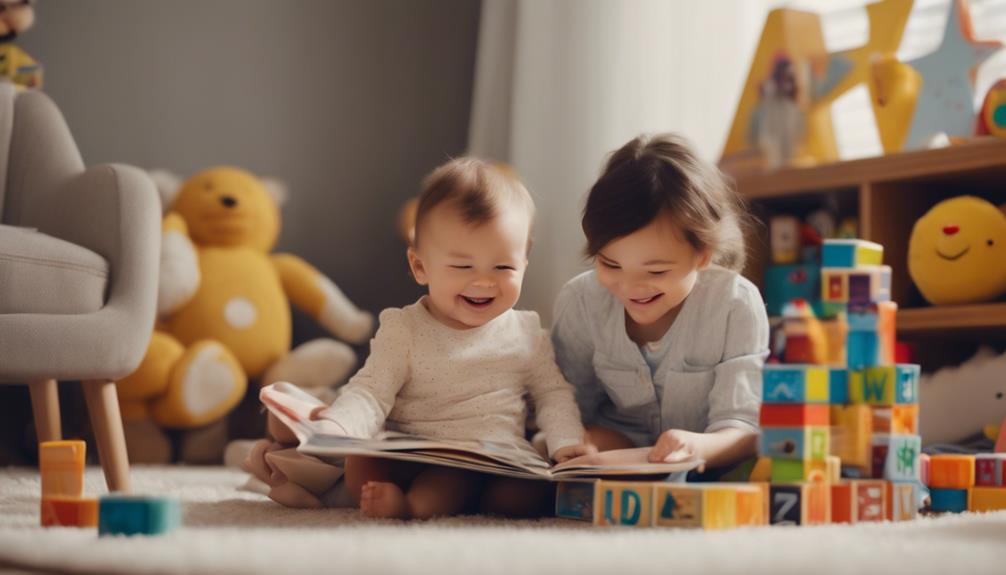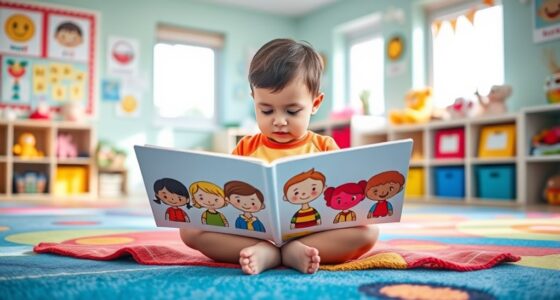When your baby starts showing signs of readiness, such as being curious about words or letters, it is a good time to begin teaching. Exposing them to reading at an early age can help with language development and improve cognitive skills. Use colorful illustrations and fun voices to create an interactive experience. Foster their curiosity by forming positive bonds with books and using engaging storytelling techniques. You may also want to try age-appropriate activities like interactive board books with sensory features. These approaches can help develop pre-literacy skills and set a solid foundation for future learning. To learn more about instilling a love for literature in your young one, continue exploring.
Key Takeaways
- Start teaching baby to read as early as 6 months old.
- Introduce books during daily routines for familiarity.
- Use engaging techniques like colorful illustrations and interactive elements.
- Foster a positive reading environment to encourage curiosity.
- Focus on building a love for books and language from infancy.
Signs of Readiness
If your baby is displaying an interest in books and showing curiosity about words, they might be showing signs of readiness to start learning to read. Recognizing letters and sounds, along with a fascination for written words, are early indicators that your child may be ready to start reading at an early age.
Babies who show a desire to learn to read, perhaps by following along with simple texts or displaying engagement with reading materials, are often primed for reading instruction.
It is essential to observe your child's behavior closely to identify these signs of readiness. Early signs can include actively engaging with reading materials, demonstrating an interest in stories, and showcasing a willingness to explore the world of words.
Benefits of Early Reading

Reading to babies early on offers numerous advantages, including enhancing their language skills and cognitive development. When you start teaching your baby to read from a young age, you're setting them up for future success. Here are some benefits of early reading:
- Improved Language Development: Babies who are read to early tend to have better vocabulary and literacy skills later in life.
- Enhanced Parent-Child Relationship: Shared reading during infancy can strengthen the bond between you and your baby.
- Boosted Cognitive Skills: Research suggests that reading to babies can improve their fine-motor and problem-solving abilities.
- Long-Term Developmental Benefits: Starting to read to babies before their first birthday has been linked to long-term positive effects on their overall development.
Teaching Techniques for Babies

To successfully introduce reading to babies, make sure that books are easily accessible in your home and incorporate engaging elements like silly voices, rhyming, and colorful illustrations to captivate their interest.
Reading aloud to babies from an early age is vital for their cognitive development and language skills. During the early childhood stage, teaching reading can be a fun and interactive experience by using board books with textures and interactive features suitable for babies aged 3 to 6 months.
Additionally, involving babies by pointing out objects in the books and attending storytime sessions at the library can be beneficial for those aged 6 to 12 months. By making reading a regular part of your daily routine and incorporating these techniques, you can create a nurturing environment that fosters a love for books and learning in your baby.
Encouraging Reading Curiosity

Encourage your baby's curiosity in reading by creating a stimulating environment filled with colorful books and engaging storytelling. To foster a love for reading in your little one, consider the following:
- Reading to Children: Start reading to your baby early, even before they're born, as it can have a positive impact on their language development.
- Building a Positive Relationship with Books: Reading to babies before their first birthday helps establish a strong connection with books and language, setting the foundation for a lifelong love of reading.
- Early Exposure to Books: Make books easily accessible to your baby and incorporate elements like vibrant illustrations and touch-and-feel textures to capture their attention and spark curiosity.
- Engaging Storytelling Techniques: Point out objects in books, use different voices while reading, and involve your baby in storytime activities at the library to make reading a fun and interactive experience.
Age-Appropriate Reading Activities

Introduce interactive board books with sensory features to engage babies aged 3 to 6 months in early reading experiences. These interactive board books, designed specifically for infants, help in developing their reading readiness by stimulating their senses and promoting engagement with colorful images and textures. As babies explore these books, they start building essential pre-literacy skills such as visual recognition and sensory perception.
Providing babies aged 6 to 12 months with board books that focus on pointing out objects can further enhance their literacy skills. Additionally, attending storytime sessions at the library exposes babies to language patterns and storytelling, fostering a deeper understanding of narrative structures.
To continue nurturing a love for reading in toddlers, make books easily accessible during daily routines. Rereading favorite books with toddlers not only strengthens their pre-literacy skills but also improves comprehension and fluency as they grow.
Frequently Asked Questions
When Should I Introduce My Baby to Read?
Introduce your baby to reading early. Sharing books supports their development and emotional growth. Start before their first birthday, as it's never too soon. Incorporate reading into daily routines for language and bonding benefits.
Can a Child Read at 2 Years Old?
At 2 years old, most children are not able to read, but they can show signs of readiness by recognizing letters and symbols. Reading to them early fosters a love for books and language development.
When Should I Introduce My Child to Reading?
You should introduce your child to reading at an early age. Starting before their first birthday is ideal. Reading to babies fosters language development, builds a positive relationship with books, and can be easily incorporated into daily routines.
When Should I Start Reading to My Baby While Pregnant?
Start reading to your baby while pregnant to foster bonding and introduce them to language. Your voice and stories can be comforting and familiar once they are born. Begin this beautiful journey of storytelling early.
Conclusion
To sum up, understanding when to start teaching your baby to read is pivotal for their development. By identifying signs of readiness, applying appropriate techniques, and nurturing a curiosity for reading, you can set your child up for success.
Remember, it's never too early to start introducing your little one to the world of words and stories. So, go ahead and immerse yourself in the world of early literacy with your baby – the future is bright for your little bookworm!










